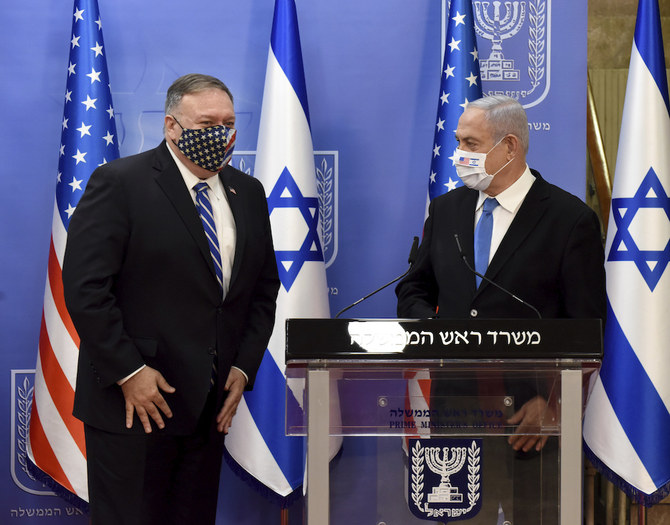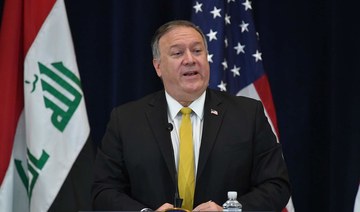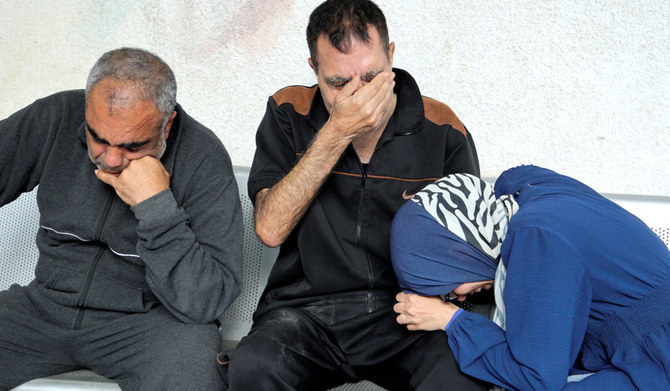JERUSALEM: US Secretary of State Mike Pompeo said he hoped other Arab countries would also establish diplomatic relations with Israel as he kicked off a Mideast tour on Monday to press the momentum of the Trump administration’s Arab-Israeli peace push.
Pompeo spoke during a joint statement with Israeli Prime Minister Benjamin Netanyahu in Jerusalem, the first stop on a multi-country tour of the region following the Aug. 13 announcement of the historic agreement between Israel and the UAE, brokered by Washington, to establish diplomatic ties.
Opinion
This section contains relevant reference points, placed in (Opinion field)
“I am hopeful that we will see other Arab nations join in this," Pompeo said. “The opportunity for them to work alongside, to recognize the state of Israel and to work alongside them will not only increase Middle East stability, but it will improve the lives for the people of their own countries as well.”
The Israel-UAE agreement delivered a key foreign policy victory to President Donald Trump as he seeks reelection and reflected a changing Middle East in which shared concerns about archenemy Iran have largely overtaken traditional Arab support for the Palestinians.
Both Pompeo and Netanyahu criticized the lack of international support for the US demand for the restoration of UN sanctions against Iran. The Trump administration has been pushing at the Security Council to have so-called “snapback” sanctions imposed on Iran over what Washington says is Iran’s violation of the 2015 nuclear deal with world powers.
“We are determined to use every tool that we have to ensure they can't get access to high-end weapon systems,” Pompeo said. “The rest of the world should join us."
Earlier this month, the US, Israel and the UAE announced the deal to establish full diplomatic relations, which also requires Israel to freeze its plans to annex parts of the occupied West Bank sought by the Palestinians as part of their future state.
Netanyahu called the agreement “a boon to peace and regional stability” that “heralds a new era where we could have other nations join.” He restated that the agreement does not include Israel’s acceptance of the sale of sophisticated weaponry to the Emirates.
Pompeo said the US was committed to maintaining Israel’s “qualitative military edge” and would be reviewing arms deals with the UAE.
Later in the trip, Pompeo was to meet with Netanyahu's partner in the government and Defense Minister Benny Gantz, as well as Foreign Minister Gabi Ashkenazi.
After his Israel stop Pompeo was also slated to visit Sudan, the UAE and Bahrain, with additional stops in the Gulf possible, the State Department had said. In Sudan, the secretary of state said he would push for “deepening the Sudan-Israel relationship.”
British Foreign Secretary Dominic Raab was also arriving in Jerusalem on Monday for meetings with Israeli and Palestinian officials in an effort “to press for renewed dialogue” and a negotiated two-state solution to the conflict.
Ahead of Pompeo's arrival, the Israeli military said it struck militant targets in the Gaza Strip early on Monday, in response to incendiary balloons launched into Israel the day before. It was the latest exchange as tensions between the two sides intensified in recent weeks.
The army said it bombed “military posts and an underground infrastructure” belonging to Hamas, the Palestinian militant group that rules Gaza. There were no immediate reports of any casualties.
Militants affiliated with Hamas have launched scores of incendiary balloons into southern Israel in recent weeks in a bid to pressure Israel to ease the blockade imposed since Hamas took control of the territory in 2007. On Friday, Palestinian militants launched 12 rockets at Israel, nine of which were intercepted, in the largest outbreak of violence in recent months.
Israel has responded to the balloons and sporadic rocket fire with airstrikes targeting militant positions.
Israel and Hamas have fought three wars and numerous smaller skirmishes in the past 13 years. Last week Egyptian mediators tried to ease tensions and bolster the informal truce between Israel and Hamas that has largely held since the 2014 war in Gaza.


























